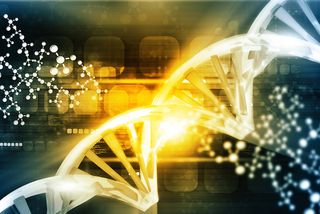Unexplained 'Genetic Superheroes' Overcome Disease Mutations

A tiny number of people in the world carry genetic mutations that were thought to guarantee the development of severe childhood diseases, but these people do not actually have these diseases, according to a new study.
In the study, researchers looked at the genetic data from more than half a million people from around the world. The scientists found 13 adults who carried the exact genetic mutations that cause diseases such as cystic fibrosis, which severely affects the lungs and digestive system, or a condition called Pfeiffer syndrome, which affects the bones of the skull. But despite the mutations, these adults had not developed these diseases.
The results may be the first step toward identifying ways to prevent other people who also have these mutations from developing such diseases, the researchers said.
"If you want to develop therapies for prevention, if you want to come up with ways of not just finding the cause, but [also] ways of preventing the manifestations of disease," then these individuals may help find a way, Stephen Friend, a co-author of the study and a researcher at Sage Bionetworks in Seattle, said in a press briefing about the new study. "We now have tools that allow us to search for people who should have gotten sick" but didn't, he said.
The idea of the new research was, "study the healthy, don't just study the sick," Friend said. [7 Diseases You Can Learn About From a Genetic Test]
In the study, the researchers looked at the genetic data of about 589,000 people. The information came from 12 previously collected data sets. The researchers said they wanted to see if, among these people, there were any individuals who remained healthy despite carrying certain genetic mutations linked to severe childhood disorders.
The researchers focused on diseases that are caused by mutations in a single gene, and have severe symptoms that generally show up early in childhood.
Sign up for the Live Science daily newsletter now
Get the world’s most fascinating discoveries delivered straight to your inbox.
In their search, the investigators found three adults who did not have cystic fibrosis, despite having mutations on both copies of the CFTR gene, which normally causes the condition, according to the study, published today (April 11) in the journal Nature Biotechnology.
Three other adults identified in the study lacked a certain form of a skeletal condition called atelosteogenesis, despite carrying mutations on both copies of the gene called the SLC26A2 genethat is linked with the disorder. Atelosteogenesisis usually lethal at birth, or shortly afterward, according to the National Institutes of Health.
Other people in the study lacked conditions such as familial dysautonomia (which affects nerve cells, and can result in sudden death during childhood), Smith-Lemli-Opitz syndrome (which causes widespread developmental problems throughout the body), and epidermolysis bullosa simplex (a severe skin condition), despite having mutations in the genes for these conditions.
The researchers said they don't know for sure exactly why these people failed to develop the diseases that they seemed genetically destined for.
However, one possibility is that these individuals also have other genes that somehow suppress these disease-causing mutations, preventing these people from getting sick, said study co-author Rong Chen, director of clinical genome informatics at the Icahn Institute of Genetics and Multiscale Biology in New York.
"It is the first [study] to try to systematically identify these unique individuals that are walking amongst us, that have genetic mutations that should result in a disease that they don't have," said Scott J. Hebbring, an associateresearch scientist at the Marshfield Clinic Research Foundation, who was not involved in the study. [Genetics By the Numbers: 10 Tantalizing Tales]
"These could have important implications when it comes to finding ways to treat these diseases," he told Live Science.
However, the researchers noted the study had limitations. For example, the investigators said they were not able to contact the 13 people identified in the study, because the researchers did not have the means to obtain consent from the people to do so. This means the scientists were not able to interview the individuals, physically examine them or verify the accuracy of the genetic information that the researchers got from the previously collected data sets.
It is therefore not possible to determine with certainty that these people are truly resistant to these diseases without further information, the researchers said.
But the scientists said they are now planning to conduct another study, in which people would first sign up to have their genes analyzed, and then the researchers would follow up with those individuals over a certain period of time.
Follow Agata Blaszczak-Boxe on Twitter. Follow Live Science @livescience, Facebook & Google+. Originally published on Live Science.
